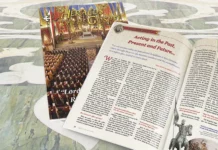The hustle and bustle of today’s routine means that we often fail to give due importance to family life. Why not take advantage of the current circumstances to increase our love and devotion?
In March, everything changed. Suddenly, events brought us back to a close-knit family life, typical of former times. Many of us are forced to stay at home all day; the children no longer go to school, although they have homework.
We are together; we share every meal and every leisure moment. Our conversations can stretch out, without great concern about the passing hours. Remaining inside our homes, we abide in what St. John Paul II always referred to as a “domestic church”.
Faced with all these changes, what can be done to establish a dignified and elevated familial interaction, in order to mitigate the loss that we feel of external activities?
We must follow the example of the Family of Nazareth
Many encourage families to establish a daily routine, which is certainly excellent advice so as to take best advantage of time.
However, few stop to think that our confinement takes place in exactly the place where every man feels most comfortable: his own home. This happy circumstance gives us a special chance to grow in virtue, remembering that “everything God works for good with those who love Him” (Rom 8:28).
Once we are fully convinced of this, we will notice that the change of routine offers a beautiful opportunity for us to get closer to those we love most, because, as Dona Lucilia Ribeiro dos Santos said, “to live is to be together, to look upon and to love one another.” And in this regard we Catholics must follow the ultimate and perfect model: the Holy Family.
We are together; we share every meal and every leisure moment. Our conversations can stretch out, without great concern …
Commenting on this relationship between Our Lord, Our Lady and St. Joseph, Dr. Plinio imagined them “alone in the House of Nazareth, in the evening, after a meal that was frugal but entirely agreeable, because they were together, looked upon and loved one another. What an unspeakable happiness to be united, to converse, to exchange thoughts and the desires of the soul!”1
The interrelationship in Catholic homes should especially mirror the affability and high-mindedness that marked daily life in the House of Nazareth. To follow the Holy Family’s example, family members must make their hearts like altars upon which they offer to the Lord all their difficulties, like a sacrifice of sweet odour.
Mutual giving is fundamental
If we wish to live the joys of family life, we must practise mutual giving: parents must strive to give witnesses, by their example of life, to the ideal of dedication to their offspring; and children must demonstrate obedience, respect and a generous commitment to help. If these dispositions are established, considerable progress will have been made.
Nevertheless, even after making this heroic resolution, disagreements will continue to arise within the family. But they can be promptly resolved with a request for forgiveness, similar in some way to that which is made in the confessional.
Moreover, families would benefit greatly by adding moments of silence to their daily routine, in order to think, meditate and reflect. To be sacral, relationships must be imbued with a religious spirit and elevation of thought. After all, good conversations are only established when the soul turns to God.
Relationships must be imbued with a religious spirit and elevation of thought; good conversations are only established when the soul is turned to God
In this sense, Dr. Plinio recalled that “when we have conversations motivated by the love of God and neighbour, interaction is pleasant. Otherwise, manners become detestable, lacking affability, and marked by a revolutionary character. […] Let us imagine a dialogue between two people who strive to fulfil the Ten Commandments in an exemplary manner. It is Heaven.”2
None of this takes place without prayer
Even during daily activities, our soul must be continually turned to God. Thus, no situation, no matter how difficult, can rob us of our peace of soul.
Before all else, we must pray as a family! Only prayer has the power to instil in homes an atmosphere marked by God’s presence and by the example of self-giving, of both parents and children, in which fraternal and loving communion sets the tone for daily life together.
“Prayer is an indispensable and sure way to obtain salvation and all the means that lead to it. […] If you pray, you will certainly be saved; if not, you will certainly be lost. […] The reason is that in order to do good today, to overcome temptations, to practise the virtues, in a word, to observe fully the Divine Law, the insights received, our own reflections and our good intentions are not enough: the actual assistance of God is indispensable; the Lord only grants this actual help to those who pray perseveringly.”3
Before all else, we must pray as a family: “If you pray, you will certainly be saved; if not, you will certainly be lost”
Therefore, we must not fail to give priority to praying the holy Rosary, as well as to the reading of the Gospel or the life of some Saint. If we do so, Our Lord Jesus Christ will accompany and protect us, for He has promised: “where two or three are gathered in My name, there am I in the midst of them” (Mt 18:20).
Let us take advantage of this departure from the frenetic pace of modern life, which so often enslaves humanity to the things of the earth, to turn toward the supernatural with great faith. In this way, we will sanctify the family, the most beautiful thing a husband a man and woman can constitute. ◊







